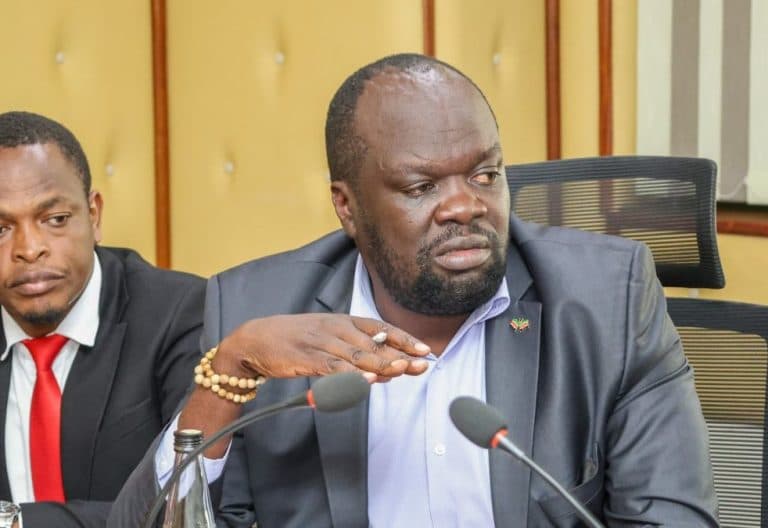We're loading the full news article for you. This includes the article content, images, author information, and related articles.
Kileleshwa MCA Robert Alai has vowed to leave the Orange Democratic Movement if party leaders persist in demanding the Deputy President slot from President William Ruto, exposing deep rifts within the party.

NAIROBI – Kileleshwa Member of County Assembly Robert Alai on Wednesday, November 5, 2025, declared he would quit the Orange Democratic Movement (ODM) if the party continues to issue demands to President William Ruto for the 2027 General Election. This public ultimatum escalates an internal power struggle over the party's future direction following the death of its founder, Raila Odinga.
Speaking to a local television station, Alai condemned what he termed as "intimidation" and "blackmail" by senior ODM figures. His comments were a direct response to a statement made on Sunday, November 2, 2025, by acting ODM leader Dr. Oburu Oginga, who asserted that the minimum position the party would accept in any political alliance with President Ruto's camp is that of Deputy President.
“The DP position cannot be given to you through intimidation. We must not allow people to intimidate the president,” Alai stated on Wednesday. “Anyone wishing to be made the DP must be humble and come with no conditions.” He further threatened to align with other political players if the demands persist.
Alai’s stance highlights a significant ideological fissure within Kenya's largest opposition party. One faction, which Alai champions, advocates for unconditional support for President Ruto’s administration, building on the broad-based government agreement initiated by the late Raila Odinga and President Ruto. This group argues that since ODM is already benefiting from appointments to government positions, including ministries and Principal Secretaries, it should not impose conditions for its support in 2027.
“We are going to 2027 as ODM to support President Ruto WITHOUT CONDITIONS,” Alai had previously stated on Monday, November 3, 2025. He warned that only Raila Odinga possessed the political stature to make such high-stakes demands.
Conversely, another camp within ODM, reportedly including Secretary-General Edwin Sifuna and other senior leaders, appears to be pursuing a more cautious and strategic engagement. This faction insists on negotiating from a position of strength. Dr. Oburu Oginga articulated this view, emphasizing the need to strengthen ODM internally before entering any negotiations. “Nobody will respect you or negotiate with you if you are a weak party. Our emphasis is on strengthening our party, ODM, so that we can negotiate for the top position in the land,” he said on November 2.
The controversy is rooted in the interpretation of the “broad-based government” pact. Following Raila Odinga's passing, ODM's Central Committee, in a meeting on October 27, 2025, formally installed Dr. Oginga as the acting leader and reiterated the party's commitment to the arrangement until 2027. The party's official statement, read by Edwin Sifuna, aimed to quell rumors of a fallout.
However, Alai, a former fierce government critic who has transformed into a vocal defender of the Ruto administration, argues that some party members are not fully committed to this pact. He has publicly clashed with Sifuna and other leaders who have expressed skepticism about the alliance or suggested ODM should field its own presidential candidate in 2027.
Political analysts suggest these public disagreements signal a profound struggle for control and ideological direction as ODM navigates its post-Raila era. The conflicting statements from its top leadership—from demands for the deputy presidency to calls for unconditional support—create uncertainty about the party's strategic path and its role in the national political landscape ahead of the 2027 elections.
Alai’s threat to exit the party, a significant move for a prominent Nairobi MCA, places further pressure on the new leadership to unify its ranks and present a coherent strategy to both its supporters and its political partners. The resolution of this internal conflict will likely define ODM's bargaining power and its relevance in Kenya's evolving political alliances.
Keep the conversation in one place—threads here stay linked to the story and in the forums.
Other hot threads
E-sports and Gaming Community in Kenya
Active 8 months ago
The Role of Technology in Modern Agriculture (AgriTech)
Active 8 months ago
Popular Recreational Activities Across Counties
Active 8 months ago
Investing in Youth Sports Development Programs
Active 8 months ago
Key figures and persons of interest featured in this article